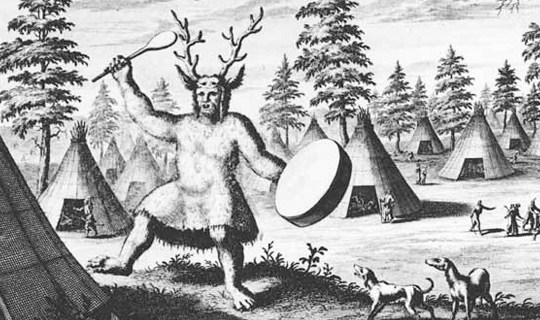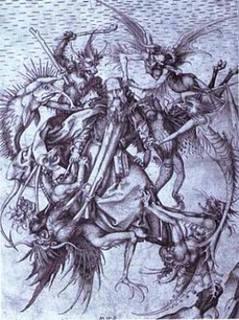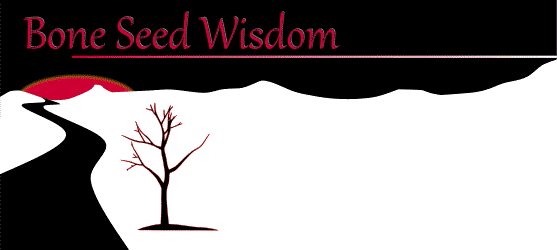|
“The Bushmen in the Kalahari Desert talk about the two
hungers. There is the Great Hunger and there is the little hunger. The little
hunger wants food for the belly; but the Great Hunger, the greatest hunger of
all, is the hunger for meaning... There is ultimately only one thing that makes human beings
deeply and profoundly bitter, and that is to have thrust upon them a life
without meaning.
There is nothing wrong in searching for happiness. But of
far more comfort to the soul is something greater than happiness or unhappiness,
and that is meaning. Because meaning transfigures all. Once what you are doing
has for you meaning, it is irrelevant whether you're happy or unhappy. You are
content - you are not alone in your Spirit - you belong.” -
Lawrence van der Post
(Afrikaans Author, Philosopher and godfather to Prince William)
Background on Shamanism and
Shamanic Practice
Shamanism is the oldest form of healing and spiritual practice in human
cultural and evolutionary history. From archaeological and historical records,
it is clear that shamanism pre-dated all forms of institutionalised religious
and spiritual practices and, indeed, gave many of those later forms their very
core values and concepts. Shamanism, moreover, has persisted so that it is alive
and well in many of the world’s cultures, including our own here in Australia.
 The
beauty of shamanism lies in the fact that it derives its power from the ability
of human beings to transcend the limits of ordinary [culturally prescribed]
perception and to take flight into imaginal realms, the far reaches of
consciousness. This provides a method for gaining greater perspective, wisdom
and guidance regarding the human condition …. suffering, uncertainty and stress,
for example. The domains of knowledge and action are expanded into mystical
insight, intuition and ESP; the notion of the self is extended beyond one world
and into many. The
beauty of shamanism lies in the fact that it derives its power from the ability
of human beings to transcend the limits of ordinary [culturally prescribed]
perception and to take flight into imaginal realms, the far reaches of
consciousness. This provides a method for gaining greater perspective, wisdom
and guidance regarding the human condition …. suffering, uncertainty and stress,
for example. The domains of knowledge and action are expanded into mystical
insight, intuition and ESP; the notion of the self is extended beyond one world
and into many.
Shamans take journeys into these other worlds to expand upon the everyday
tools which can serve us in our needs for healing and guidance. They are masters
of the technologies of consciousness. This is what is called Visionary Practice.
It allows the fullest extent of human potentials to be accessed through the
experience of being in other worlds, travelling through them and gaining the
resources which can help all people.
Moreover, shamanic practice which revolves around visionary practce involves
the capacity to perform meaningful and dynamic rituals for persons at all stages
of their lives…. birth, initiation [childhood to adulthood], marriage, life
transitions, death, for example, as well as specialised healing rituals for
individuals and groups.
Shamans are the voyagers through the many worlds of human possibility and,
because of this, they are able to provide the spiritual maps and compasses which
orient and guide us through difficult phases in our lives. In the course of
this, we can discover our medicine which is the vital principle which defines us
and which relates us to all life and all worlds. It is the power to realise
ourselves completely.
So it is that shamanic practice is concerned with the journey of the soul:
our life’s journey at the profound spiritual level which informs and shapes all
other levels of our existence.
Shamanic practice is powerful and relevant in the contemporary world in its
own right. But it is extremely potent when combined with knowledge and practice
from medicine, psychiatry, psychology, anthropology and the spectrum of helping
professions.
The oldest profession is the most enduring since the thread which connects us
with our ancestors is the search for meaning, self-realisation, transcendence of
suffering, healing and a sense of belonging in both world and cosmos.
Dr Rafael Locke - Founder and Medicine Chief of the
Spirit of the Earth Medicine Society
Frequently Asked Questions
What is shamanism?
Shamanism is the oldest form of spiritual practice in human cultural and
evolutionary history. Shamans master being able to change states of
consciousness to journey into other worlds in order to discover whatever is
needed to effect healing or problem-solving for individuals and communities.
Shamans are masters of ritual and consciousness processes.
Where does the term Shaman come from ?
The original term was probably derived from the word šamán which comes from
the Tungusic languages in Eastern Siberia. Anthropologists started using
the term shaman to describe a wide range of culturally different traditional
practices that, on the surface, had a similar theme of utilising altered states
of consciousness and spiritual realms to affect changes or gain knowledge that
cannot be gained in the ordinary sense. The term has taken on wide use in
contemporary society, however it is important to remember that it is a generic umbrella term to describe numerous
and varied cultural practices around the world. So to claim to be a
shaman, one would expect to be proficient in a certain traditional or cultural
practice as the term 'shaman' cannot exist in
isolation of an underlying cultural or traditional practice.
What is a shamanic practitioner?
In our modern society, there are few opportunities for full-scale,
traditional shamanic training which involves long apprenticeships and
initiation. So, a shamanic practitioner is a person who is trained in the arts
of shamanism by persons who are shamans or who have extensive experience in
shamanic work in the context of Australian society. They are professional,
knowledgeable about the field and able to deliver services which are relevant to
clients who require healing, personal or spiritual development, or guidance. The
shamanic practitioner uses all conventional forms of intelligence as well as
spiritual intelligence.
Can shamanic practice help anyone or only particular problems?
Shamanic practitioners are able to assist with a wide range of issues which
occur in our society, from serious illness through to the need for life
direction and purpose. The key is this: shamanic work is directed at the soul
level, the journey of the soul and the way in which that affects the domains of
body, mind and social being. Therefore, it can help in all situations but there
is no claim to miraculously cure people of cancer or HIV, for example. Shamanic
work is particularly effective in cases where there is a clear spiritual
component to clients’ concerns….. life direction, self-realisation, questions of
meaning, and the ability to self-heal.
Do shamanic practitioners have psychic powers?
In shamanism, the emphasis is on soul work and being able to perform this
through the use of specific states of consciousness. As a consequence of this
approach, extrasensory perception may occur, but that is not the main focus of the
work. Deep movement at the soul level is the focus.
Can anyone call themselves a shaman?
Unfortunately, yes. There is no common convention that defines
what a shaman entails, so it is a frequently used and misused title. The
important detail to recognise is whether the person is traditionally trained and
initiated as a shaman and into which culture or tradition. Are they recognised as such within the
actual culture that they are claiming to be a shaman of ?
Every culture has their own language and description for the word shaman, and so
the person should be able to provide more details about the traditions they are
claiming to represent.
I have been told that I have entities that need to be removed. What
should I do?
 The first thing is not to panic and get into a state of anxiety about it.
There are many theories and perspectives and there is a high likelyhood that a
person that suggested that, subscribes to a more new age paradigm of modern
shamanism. Diagnosing 'entities' or malevolent forces is an advanced
skilled that requires significant focus and attention, so it is unlikely to be
the case in simple settings. It is always best to get a second or even
third opinion in a more focused and dedicated setting. Nevertheless, there
are many powerful purification ceremonies, such as the
sweatlodge ceremony, that
one can undergo to help rid oneself of negative feelings or energy that one
experiences. The first thing is not to panic and get into a state of anxiety about it.
There are many theories and perspectives and there is a high likelyhood that a
person that suggested that, subscribes to a more new age paradigm of modern
shamanism. Diagnosing 'entities' or malevolent forces is an advanced
skilled that requires significant focus and attention, so it is unlikely to be
the case in simple settings. It is always best to get a second or even
third opinion in a more focused and dedicated setting. Nevertheless, there
are many powerful purification ceremonies, such as the
sweatlodge ceremony, that
one can undergo to help rid oneself of negative feelings or energy that one
experiences.
I believe that someone has cast an evil spell or curse on me or my
family. What should I do?
Once again, do not panic or get into a state of anxiety. Sorcery or
witchcraft is very real and prevalent in many traditional cultures (eg. in the
form of tsentsak in South
America ayahuasca ceremonies, or the Southern African
Tokoloshe used by
Tagathi (witches) or even the
Kurdaitcha (Pointing the
Bone) of the Arrernte Aboriginal People in Central Australia). In all
these instances, sorcery is only performed by very highly skilled practitioners.
It takes an incredible amount of energy and focus to sorcerise someone, so it is
not performed lightly. It is also very rare in western contemporary
culture, as the skill and attention required is very rare in our culture.
If you have been involved in traditional cultures in their setting, or feel that
you have performed some kind of transgression on aboriginal soil, then it is a
possibility. In those circumstances, a proper diagnosis is required and
removal from the curse would be necessary, if applicable. Curses generally
occur by getting more severe over time, so there is usually no immediate danger.
Future protection or house purification is also possible for suitable
circumstances.
| 
